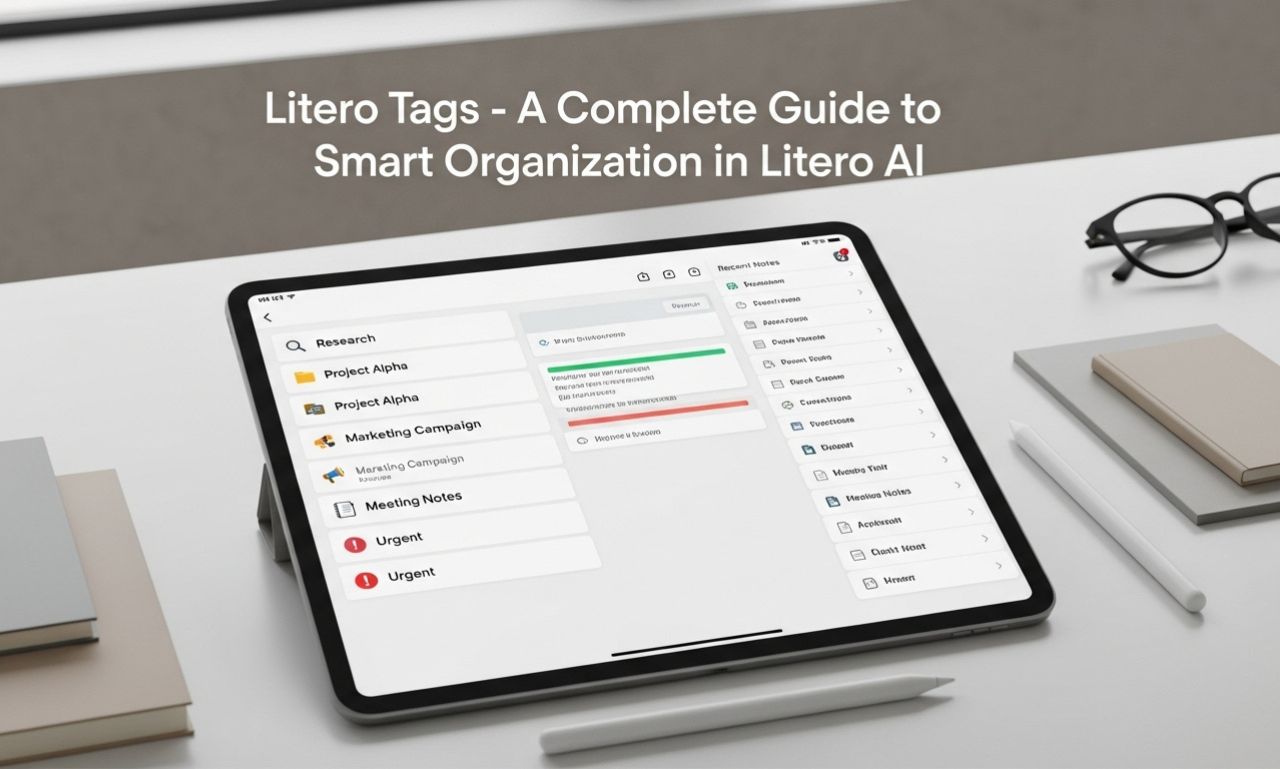In the modern era of AI-assisted writing, organization is everything. Tools like Litero AI are revolutionizing how students, researchers, and professionals manage their work. One feature that stands out in this space is Litero Tags — a system that helps users categorize, track, and refine their projects efficiently.
This article provides a detailed overview of LiteroTags, explaining what they are, how they work, and how they can improve your productivity and academic writing process.
What Are Litero Tags?
LiteroTags refer to an innovative labeling or categorization system used within the Litero AI platform. These tags act as organizational markers, allowing users to group, identify, and manage different sections or versions of their written work.
In simple terms, Litero Tags help you:
-
Organize your documents by theme or subject
-
Mark sections for revision or citation
-
Identify AI-generated vs. human-written parts
-
Track progress and workflow
By tagging key components of your writing, you create an intelligent structure that makes your projects easier to navigate and refine.
Why Litero Tags Matter in Academic Writing
In academic and research environments, writers often deal with multiple drafts, notes, and citations. Without an effective tagging system, managing this information can quickly become overwhelming.
Here’s why LiteroTags play an important role:
-
Organization and Efficiency – LiteroTags allow quick access to specific topics or sections.
-
Better Collaboration – When working in teams, tags help everyone understand what stage each part of the project is in.
-
Workflow Optimization – Tags can indicate stages like “Needs Revision,” “Add Citations,” or “Ready for Submission.”
-
Enhanced Accuracy – AI-assisted tagging helps identify content that might need more citations or human verification.
With LiteroTags, writers can stay focused, structured, and consistent — all essential qualities in academic writing.
How Litero Tags Work in Litero AI
The Litero AI platform supports advanced writing and research features like paraphrasing, citation generation, and plagiarism checking. Integrating Litero Tags into this system enhances user control.
Here’s a step-by-step overview of how Litero Tags could function:
-
Tag Creation:
You can create tags based on topic, section, or status — for example, #Introduction, #Methods, or #NeedsCitations. -
Automatic Tag Suggestions:
AI can detect themes or missing elements and suggest tags automatically (e.g., #AddReferences if no citation appears in a section). -
Tag Management Dashboard:
A simple interface helps manage all tags, allowing you to filter, rename, or delete them. -
Color-Coding System:
Each tag can be color-coded for visual clarity — red for incomplete, green for approved, etc. -
Cross-Document Tagging:
Litero Tags can link multiple documents by subject, making it easy to find all materials related to a single research topic.
By combining AI detection and manual labeling, LiteroTags become a powerful hybrid feature for organization and quality control.
Key Benefits of Using Litero Tags
1. Streamlined Document Management
Tags help you manage large writing projects without confusion. Whether you’re working on a thesis, a journal article, or a literature review, Litero Tags let you keep everything categorized.
2. Simplified Revision Process
During revisions, tags like #NeedsEditing or #AddData act as visual reminders. This eliminates the need for sticky notes or external task lists.
3. Enhanced Collaboration
For teams or research groups, Litero Tags allow each contributor to mark their progress or tasks, such as #PendingApproval or #CompletedReview.
4. Improved Focus
Writers can filter by specific tags (like #Discussion or #Results) and work on one section at a time — improving focus and productivity.
5. Academic Integrity
Since Litero AI includes an AI detection system, LiteroTags could automatically flag AI-assisted sections. This promotes transparency and academic honesty.
Different Types of Litero Tags
Depending on your workflow, LiteroTags can be customized for different purposes. Here are the most useful types:
1. Content Tags
These identify the type of material in each section.
Examples: #Introduction, #Theory, #Methodology, #Findings, #Conclusion
2. Workflow Tags
Used to track progress or task status.
Examples: #Draft, #NeedsProofreading, #FinalVersion
3. Revision Tags
Help manage editing cycles.
Examples: #AddReferences, #Rephrase, #CheckGrammar
4. Thematic Tags
Group content by research topic or theme.
Examples: #ArtificialIntelligence, #EnvironmentalPolicy, #HumanRights
5. AI Detection Tags
Automatically assigned to areas flagged by the AI detector.
Examples: #AIFlagged, #NeedsHumanRewrite
This multi-layer tagging approach ensures both structure and flexibility across your projects.
How to Use Litero Tags Effectively
To get the most out of LiteroTags, follow these best practices:
1. Start With a Clear Tagging Plan
Define a consistent tagging system before you begin writing. Use a limited number of categories to avoid clutter.
2. Be Consistent
Keep tag names short, specific, and consistent. For example, always use #Draft instead of switching between #draft and #DraftVersion.
3. Combine Tags and Filters
Use filters in Litero AI to view only sections with specific tags. This helps when reviewing or editing long documents.
4. Update Tags Regularly
As your writing progresses, update or remove outdated tags to maintain accuracy.
5. Leverage AI-Generated Tags
If Litero AI suggests tags based on your writing, review and accept relevant ones. This saves time and ensures consistency.
SEO Power of Litero Tags in Digital Writing
Even outside the Litero AI environment, the concept of tags is vital in SEO and content writing. Just as Litero Tags help structure internal documents, web tags help structure content online.
Here’s how both connect:
| Feature | Litero Tags | SEO Tags |
|---|---|---|
| Purpose | Organize academic content | Organize web content |
| Function | Improve document workflow | Improve page ranking |
| Example | #Methods, #Revision | meta tags, alt tags, title tags |
| Benefit | Easier writing process | Better search visibility |
This similarity shows why LiteroTags are so powerful — they apply the logic of SEO to academic writing, improving both readability and discoverability.
Advantages of Litero Tags Over Traditional Methods
| Traditional Workflow | With Litero Tags |
|---|---|
| Manual section tracking | Automated tagging by AI |
| Separate notes for each draft | Unified tagging within platform |
| Time-consuming search | Instant filter by tag |
| Risk of lost context | Consistent metadata for all content |
By integrating LiteroTags, writers and researchers can manage complex projects without extra tools or confusion.
Common Mistakes to Avoid When Using Litero Tags
-
Using Too Many Tags: Over-tagging makes organization harder. Stick to essential ones.
-
Inconsistent Naming: Mixing lowercase and uppercase tags leads to duplication.
-
Forgetting to Update: Tags should evolve as the document changes.
-
Ignoring Tag Hierarchies: Plan a simple structure — main tag + sub-tags if needed.
-
Neglecting Collaboration Tags: Always use tags that help teams understand workflow.
Avoiding these mistakes ensures that LiteroTags remain an efficient tool rather than extra clutter.
Future Potential of Litero Tags
The potential for LiteroTags extends beyond current use. Future updates might include:
-
Auto-generated tag summaries – AI could create a list of tags that describe your paper.
-
Tag analytics – View data on how many sections are tagged as #Draft or #Completed.
-
Cross-project tagging – Link multiple research papers under one tag (e.g., #ThesisWork).
-
Integration with citation tools – Automatically tag references or bibliography sections.
-
Cloud synchronization – Access tags across all devices and versions.
As Litero AI continues to grow, LiteroTags could become an industry standard for academic organization.
Conclusion: Why Litero Tags Are the Future of Academic Writing
LiteroTags represent more than just a labeling system — they symbolize a shift toward smarter, AI-powered writing management. Whether you’re drafting a thesis, organizing citations, or reviewing AI-assisted content, Litero Tags can streamline your workflow and improve the clarity of your writing process.
By adopting Litero Tags, writers gain structure, teams gain transparency, and academics gain confidence in their work. In the ever-expanding digital writing landscape, LiteroTags are a simple yet powerful way to bring order, precision, and productivity to your creative and scholarly projects.

